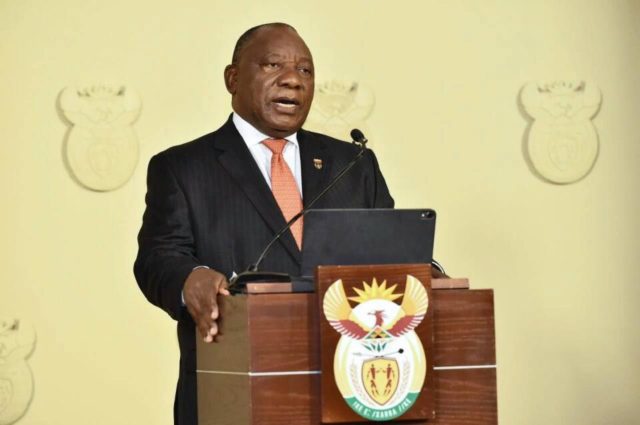“The human cost of delaying this will be far more disastrous”
President Cyril Ramaphosa last night announced a nationwide lockdown for 21 days starting at midnight on Thursday and sweeping measures aimed at saving the lives of hundreds of thousands of people.
Only patients, police and nurses will be allowed to leave home during the lockdown and individuals won’t be allowed to leave home unless it is to seek medical care, buy food, medicine and other supplies or collect a social grant.
“The human cost of delaying this will be far more disastrous,” Ramaphosa said. This comes as the spread of Covid-19 recorded a dramatic 40% spike yesterday, up to 402 cases,
The unprecedented lockdown will see all citizens ordered to stay at home and will last from midnight on Thursday until April 16, while most businesses would be closed with the exception of those that are essential, including pharmacies, laboratories, banks, supermarkets, petrol stations among the few.
Ramaphosa also announced a Solidarity Fund to assist vulnerable South Africans.
The fund will be chaired by the chief executive officer of Women Investment Portfolio Holdings, Gloria Serobe, and the deputy chairperson is billionaire businessman and owner of Nandos, Adrian Enthoven. Ramaphosa said Government is providing seed capital of R150 million and the private sector has already pledged to support this fund with financial contributions in the coming period.
“We will be spending money to save lives and to support the economy. In this regard, we must applaud the commitment made in this time of crisis by the Rupert and Oppenheimer families of
R1 billion each to assist.”
All South Africans arriving from high-risk places will automatically be placed under quarantine for 14 days, while non-South Africans arriving on flights from high-risk countries would be blocked from entering the country.
“The nationwide lockdown is necessary to fundamentally disrupt the chain of transmission across society,” Ramaphosa said.
He said the SANDF would be deployed to assist the SAPS in enforcing the lockdown.
He pointed out that the enforcement of a lockdown would save lives of South Africans, despite its inevitable lasting negative effect on the economy.
“While this measure will have a considerable impact on people’s livelihoods, on the life of our society and on our economy, the human cost of delaying this action would be far, far greater,” Ramaphosa said.
Since Sunday, Ramaphosa was locked in marathon meetings with different stakeholders, including his National Command Council of Cabinet ministers on Covid-19, business, political parties and labour as the government tried to find new stricter and effective ways of containing the spread of the infectious virus.
The new measures are part of the declaration of the state of national disaster announced by Ramaphosa last week.
Those exempted from the lockdown would include health care workers, emergency personnel, the police, traffic officers, military personnel and others who would assist to enforce the lockdown.
The latest figure saw an addition of 128 Covid-19 cases to the 274 announced by Health Minister Zweli Mkhize on Sunday evening.
The Northern Cape registered its first two confirmed cases since the first case in the country was confirmed on March 5.
The latest figures have seen Gauteng’s confirmed cases shooting up to 207, followed by the Western Cape at 100.
KwaZulu-Natal and the Free State were at 60 and 13 respectively while Mpumalanga was at 9, North West and Limpopo both at 4, while Eastern Cape and Northern Cape both had 2 cases.
The EFF had called for additional economic measures to be implemented, including tax rebates for companies and individuals, including grants with small and medium enterprises with workers to cover salaries, and for network service providers to give its customers some basic access to data and airtime for free.
Ramaphosa said the lockdown would be accompanied by a public health management programme which would increase screening, testing, and contact tracing and medical management.
“Community health teams will focus on expanding screening and testing where people live, focusing first on high-density and high-risk areas to ensure that hospitals are not overwhelmed.
“A system will be put in place for centralised patient management for severe cases and decentralised primary care for mild cases,” he said.
All South Africans arriving from high-risk places would be automatically placed under quarantine for 14 days, while non-South Africans arriving on flight from high risk countries would be blocked from entering the country.








